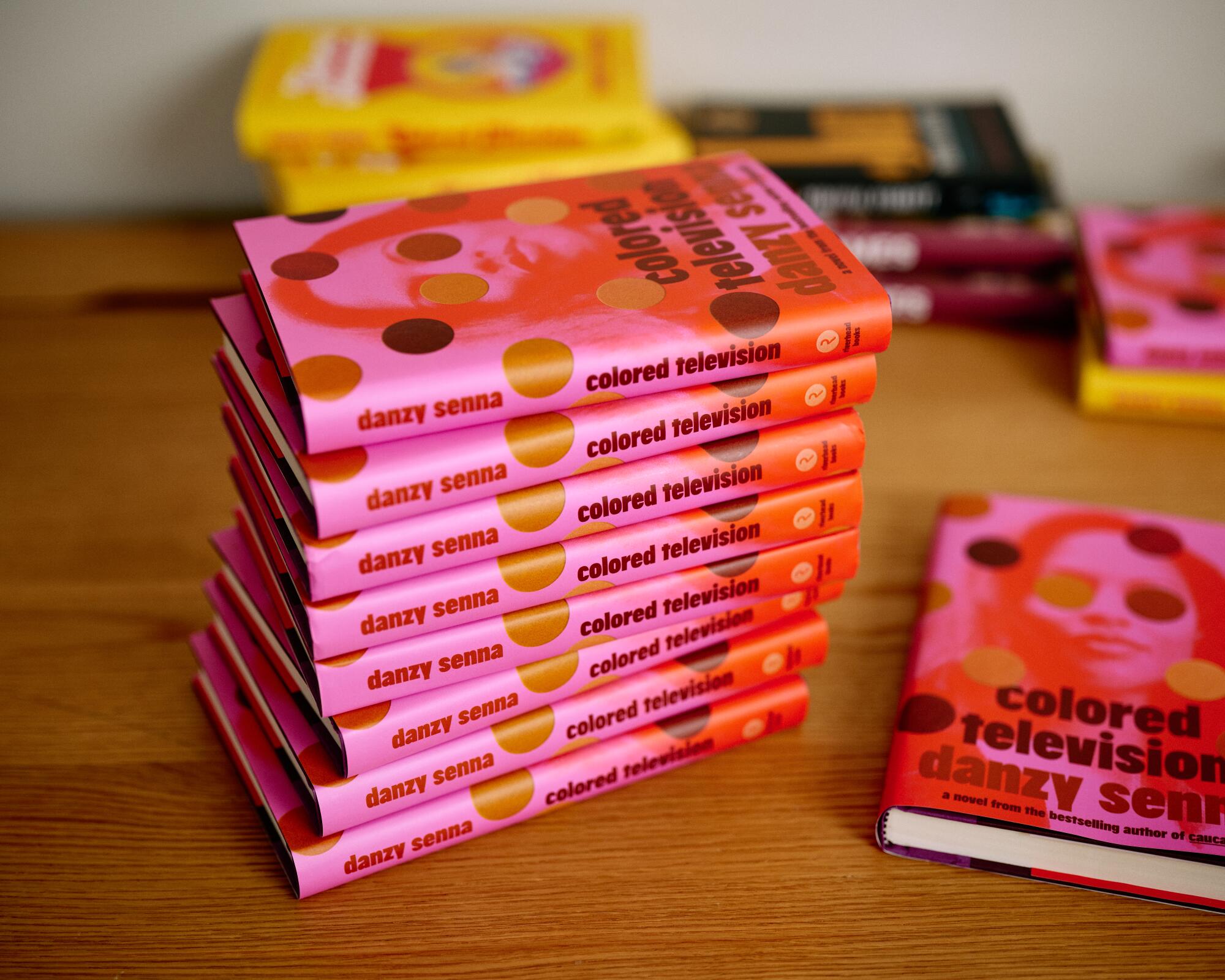
- Share via
Fall Preview Books
Colored Television
By Danzy Senna
Riverhead: 288 pages, $29
If you buy books linked on our site, The Times may earn a commission from Bookshop.org, whose fees support independent bookstores.
Danzy Senna’s first novel, 1998’s “Caucasia,” is about two biracial siblings who are forced by family circumstances to assume new identities. It was a hard sell; publishers didn’t know what to make of burying one’s ethnicity, of passing yourself off as something you aren’t. “There was bewilderment about what perspective I was writing from,” says the bestselling author, whose sixth novel, “Colored Television,” is out now. “The idea of racial passing wasn’t in the cultural conversation at all.”
The cultural climate has changed significantly since then, as all manner of stories about race can be found across media. But when does inclusion turn into crass exploitation? It’s an issue that Jane, “Colored Television’s” protagonist, has to confront when she is given the opportunity to cash in on her own biracial background for Hollywood money and a chance to make her family financially solvent.
Humor mixes with a deep understanding of American foibles and the human heart to produce a riveting novel of ideas.
Jane is a novelist in Los Angeles for whom writing, while never particularly remunerative, has stopped being fun. Her first novel was a critical hit. Ten years after, she has yet to finish her second book, which has bloomed into an elephantine “four-hundred-year history of mulatto people in fictional form” — what her husband Lenny calls a “mulatto ‘War and Peace.’” Squeezed by the high cost of living, Jane, Lenny and their two kids are constantly uprooted in search of cheaper rent. “They’d lived in the dank apartment in Silver Lake with the stash of female-oriented porn … on the bookshelves,” Senna writes. “They’d lived in the one-room back house in Venice behind the Rwandan genocide scholar who made Jane watch reality dating shows with her at night.”
When Jane and Lenny finally land in the gleaming, empty home of her grad school friend Brett, a successful screenwriter, she ditches the book and hatches a plan to usurp some of Brett’s Hollywood pixie dust by talking her way into the good graces of a Black TV producer, Hampton Ford, who is desperate for “a show with a premium vibe … the Jackie Robinson of biracial comedies.” And down goes Jane into the hall of mirrors that is TV development.

“Colored Television” is a serio-comic novel that deftly explores the complications of race, creativity, the “media-industrial complex” and family amid the backdrop of L.A., a city that has become increasingly hostile to the creative middle class. Senna, who is an English professor at USC, knows firsthand the perils of keeping your head above water as a literary novelist, of looking for a quick fix with an infusion of Hollywood money in a town that still believes it controls the cultural dialogue. “This is where the culture gets made,” Ford tells Jane during one of their “spitballing” meetings designed to summon the magic for their biracial Emmy-grabber.
Overwhelmed by her inability to transmute the complexities of her mulatto identity into literature, Jane, broke and burned out, tries to game a feckless entertainment industry that turns racial representation into prestige streaming bait, at least until the heat wears off and flames out. “Colored Television” is the kind of novel Jane might aspire to write, a very funny Hollywood takedown that offers a window into the lives of “racial nomads” who must negotiate a world that is hostile to them.
“I was interested in that point in a marriage when class issues come up,” says Senna, “and you start to think, ‘Do I want to continue to live this bohemian life, of moving all the time and being committed to the God of your art?’ Then you encounter this bright, shining thing on the hill, and you wonder, ‘You know, should I sell out to Hollywood?’”
In ‘Come and Get It,’ author Kiley Reid unpacks the unsettling dynamics of college campus capitalism.
Much of Senna’s fiction has been informed by her backstory. Her mother, Fanny Howe, is an acclaimed poet and novelist; her father, Carl Senna, was a civil rights activist of Mexican African descent who has written books on the history of the Black press and Colin Powell. “Race was a constant conversation in my family,” says Senna, who, along with her two siblings, was bused to public school in the ‘70s as part of Boston’s desegregation policy. “We grew up in a very intense racial climate,” she says. “Boston was like being biracial on steroids.”
Senna attended Stanford as an undergraduate and wrote her first novel while working toward her master of fine arts in creative writing at UC Irvine. “Before I had kids, I just sort of wrote all the time,” says Senna, the mother of two boys with her husband, novelist Percival Everett. “As I got older, I realized that I needed to create hard boundaries around my writing, because otherwise it would ruin my life, basically.”
At UC Irvine, Senna witnessed the seductive allure of show business among her fellow students, as gifted fiction writers succeeded in transitioning into a higher tax bracket. She has no issue with Hollywood trying to capitalize on identity politics, even if it is often for the wrong reasons. “I do think that, ultimately, it’s a salutary thing,” she says of the entertainment industry’s newfound race consciousness.
“What I was interested in with Hampton Ford was the scarcity model, in which the creators of this kind of content are set up to feel that there’s a time limit on the interest in stories regarding race and color,” says Senna, who has optioned a few of her previous novels to Ford-like producers. “Like, ‘Black Lives Matter? We better buy up some content!’ That attitude breeds desperation.”

Hollywood may be frantically mining race for stories, but in the real world, the issue of racial ambiguity, of being neither Black nor white, seems caught in some retrograde time warp. Witness Donald Trump recently questioning the racial identity of his opponent, Kamala Harris, a race-baiting potshot that dredges up ingrained prejudices against biracial Americans that stretch back to the antebellum South. “Colored Television” is a sharp critique of this binary preoccupation with identity, the ways in which the culture obfuscates serious issues that only breed further confusion.
“The notion of the illegitimate biracial American goes back over 200 years,” Senna says. “This suspicion of a figure who somehow destabilizes the racial binary, and the idea that Kamala Harris’ claiming of Blackness could only be a cynical political gesture, and that it doesn’t come from a much deeper alliance to the Black community, which has historically been the only community to accept people of mixed race who are part Black.”
Rebecca Godfrey died before she could complete her final novel, ‘Peggy.’ Her friend Leslie Jamison stepped in to finish it.
Even the refusal of a Black artist to signify their own Blackness through their art can be interpreted as an act of camouflage. Lenny chooses to paint pictures without Black subjects, which weakens his standing in the marketplace; one critic writes of Lenny that “you wouldn’t even know he was a Black artist.” “I don’t understand the burden to define yourself for others,” says Senna. “But this is how it is.”
By “Colored Television’s” conclusion, Jane, who has been basking in the cleansing waters of Ford’s blandishments and the promise of a potential show deal, is shuddered back into reality when Ford suddenly stops answering her texts and hires another writer. Par for the course in Hollywood, of course, but Jane soon regains her footing and returns to her authentic self.
“I think all serious artists at some point waver in their self-belief,” says Senna. “But you also have to have those moments when you are deluded enough to believe that some crazy thing will work out. Even if it means returning to what you intended to do to begin with.”
More to Read
Sign up for our Book Club newsletter
Get the latest news, events and more from the Los Angeles Times Book Club, and help us get L.A. reading and talking.
You may occasionally receive promotional content from the Los Angeles Times.














